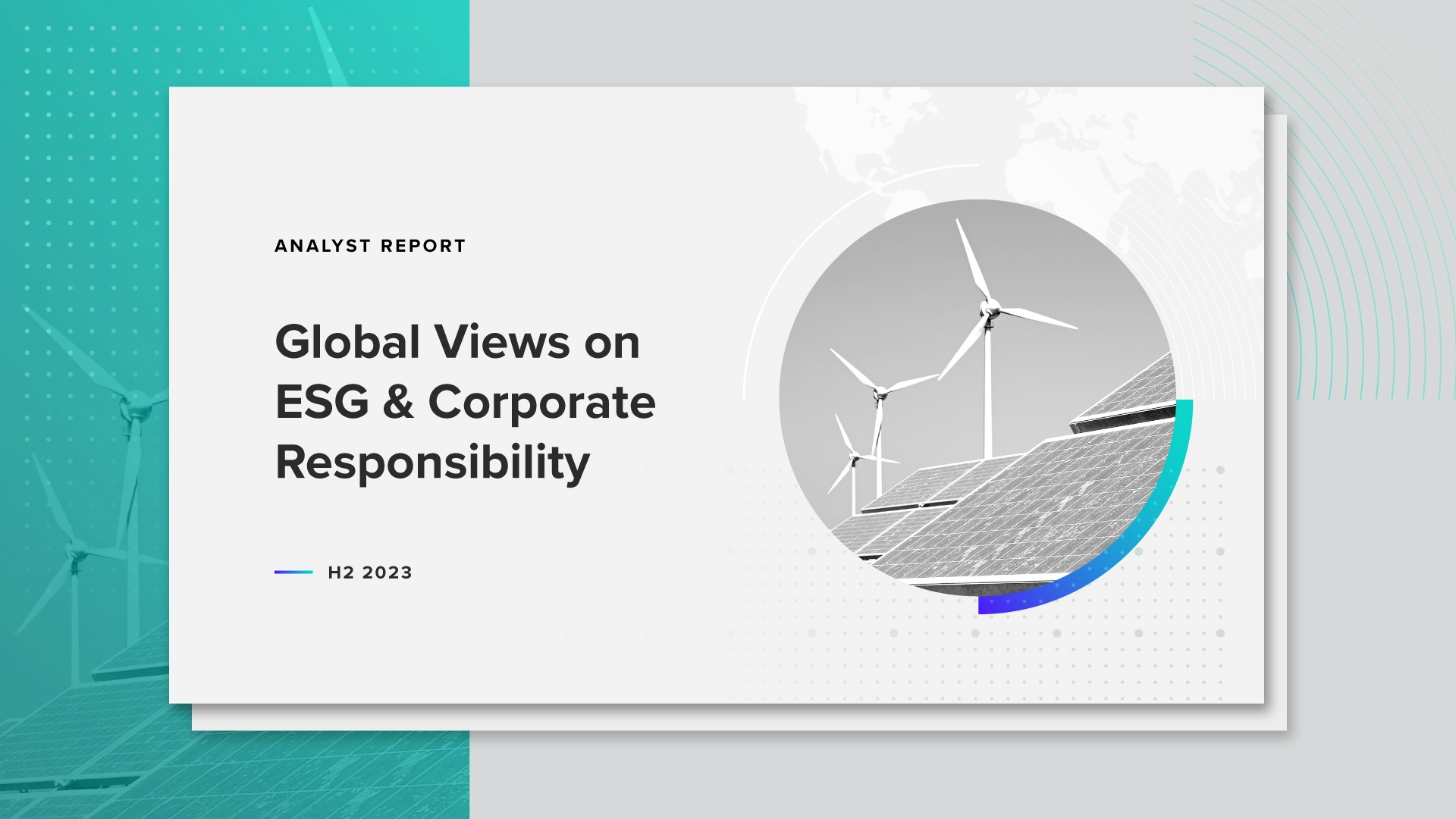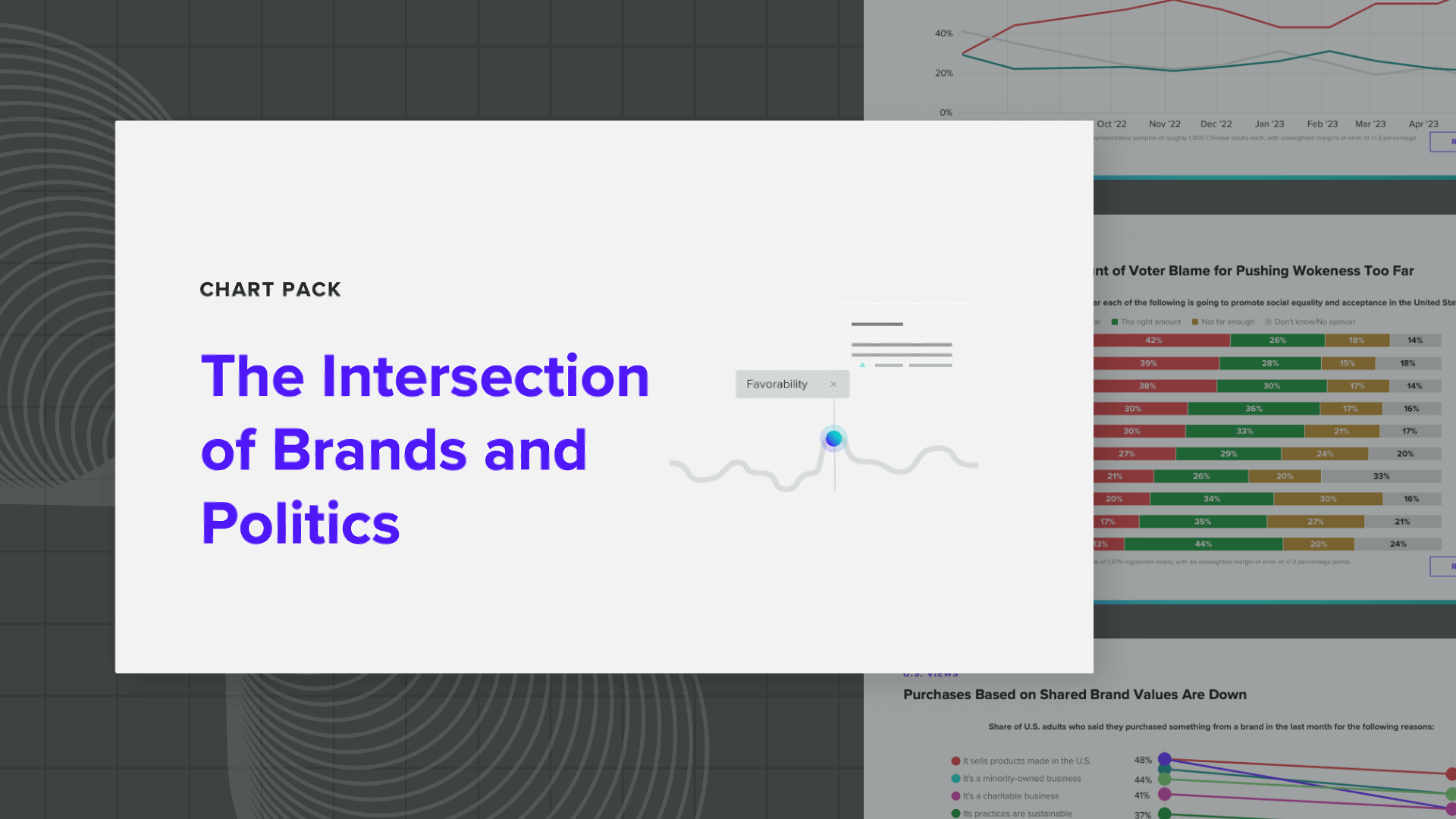ESG Investing Isn’t Grabbing Public Interest Yet — But Loyal Devotees Are All In

Key Takeaways
Fewer than 1 in 5 U.S. investors say they have investments in ESG-related funds, showing that neither the media spotlight nor increased prioritization of corporate responsibility and activism have trickled into the uptake of these funds.
However, consumers who care about ESG issues care about them a lot. The share of those who consider ESG ratings a “top priority” has nearly doubled since mid-2022.
Increased consumer education — especially among younger, more digital-savvy demographics — could close an awareness gap. With consumers prioritizing returns when making investment decisions, ensuring investors are aware that making money and supporting values aren’t mutually exclusive could increase reach.
Data Downloads
Sign up to get the latest finance data and analysis delivered to your inbox every morning.
ESG investing is becoming more prominent. Major companies continue releasing ESG reports, ESG proposals are growing, and the European Union is preparing to implement new regulations governing ESG reporting, with other countries likely to follow. It’s also become a hot-button political issue, with the efforts of anti-ESG groups spooking corporations, and The Economist arguing that the terminology has embedded itself into the culture wars.
But despite intense debate and increasing media prominence, Morning Consult data shows that engagement with ESG investments remains relatively low. Just 18% of investors say they have investments in ESG-related funds, and an additional third don’t know if they do or have no opinion.
Specific demographics at scale: Surveying thousands of consumers around the world every day powers our ability to examine and analyze perceptions and habits of more specific demographics at scale, like those featured here.
Why it matters: Leaders need a better understanding of their audiences when making key decisions. Our comprehensive approach to understanding audience profiles complements the “who” of demographics and the “what” of behavioral data with critical insights and analysis on the “why.”
This doesn’t mean that there’s no audience for ESG funds. U.S. adults are largely positive about the potential impact of ESG funds, with 54% saying that funds for ensuring reliable and easy access to clean water and 46% saying that funds dedicated to reducing or reversing the effects of climate change would have a positive impact on society. Those shares are even higher among investors. However, that interest isn’t translating into awareness or action.
Both U.S. Adults and Investors Think Various ESG Funds Would Have a Positive Impact
Understanding investor priorities and why ESG funds aren’t sticking could help providers better attract new clients and more effectively serve them in order to improve both acquisition and retention.
Awareness of ESGs remains relatively low
Interestingly, many consumers say they care quite a bit about corporate responsibility when asked directly. Just over 3 in 10 U.S. adults call environmental, social, and governmental issues “very” important when it comes to investments, with a similarly sized group calling them “somewhat important.” That care corresponds with an increase in demands for corporate activism worldwide.
But it isn’t necessarily translating to awareness of ESG investing options and opportunities. Fewer than 1 in 10 U.S. adults said they are “very” familiar with ESG investing and ratings, and an additional 14% said they are “somewhat” familiar with both. While this number increases among investors, defined as U.S. adults with at least one of four investment account types in their household, it’s remained nearly unchanged since July 2022 — signaling that increased media spotlight on ESGs hasn’t caught the eye of the general public — and underscoring why the flow of investments into U.S. ESG funds is on the decline.
Consumers aren’t hearing about ESGs from financial professionals that they work with either. Around 1 in 5 investors have discussed sustainability and ESG practices with financial professionals like financial planners and investment managers, signifying an opportunity to reach potential customers through these providers, especially because shares have improved from July 2022, when numbers were under 15% across the board. However, a notable portion of adults aren't working with financial professionals, which could represent a roadblock.
Investors’ goals signal ESG investments are only nice-to-have
Most investors still prioritize returns above all. When setting investment goals, 92% of investors say that making money in the long term is “very” or “somewhat” important, while 71% say the same about making money quickly. These numbers have remained relatively unchanged since July 2022. On the other hand, just 57% echoed the same sentiment about protecting society against companies that do not share their values, with responses remaining relatively similar across political party affiliation.
Investors Continue to Prioritize Making Money
Three factors could help explain why this is the case:
- Most investors aren’t making their own investment decisions. Among investors, the most popular investment account types are IRAs (49%) and employer-sponsored retirement accounts (47%), where dollars are deposited into managed funds. Self-managed account types, like personal brokerage (34%) and robo-adviser (11%) accounts are far less popular, indicating consumers tend to be hands off about where their money is going and therefore might pay less attention to their investments.
- Investors may not understand the relationship between investing and corporate or social change. It’s likely that many consumers, including the brimming generation of younger investors, don’t understand that being a company shareholder also offers the opportunity to vote on decisions that influence the direction of the company.
- Consumers might prefer to express their values in other ways. Even if they do understand that there’s a straight line between money and input on decision-making, they might want to get involved more directly and in ways they can have a more immediate impact, such as donating, posting on social media or volunteering.
Providers must employ different strategies with different audiences to best leverage ESG
About the same share of investors call ESG a “top” or “important” priority (37%) as those who don’t (42%) — figures that remain relatively unchanged from July 2022. But the share of customers who are most likely to call it a top priority nearly doubled in that period. And there’s a decently sized and growing group who don’t know or have no opinion (21%); they could be potentially won over with more education about these investments and their benefits.
Investors Are Split on Prioritizing ESG in Investment Decisions
These investors could be captured simply by growing awareness of the financial value of ESG funds. For example, analysts have argued that companies that prioritize ESG ratings could be “future-proofing” their business. Corporations that address climate change could also be better able to steel themselves against it and weather the storms of the future. Conveying to consumers that ESG goals and making money, both in the short and long term, are not mutually exclusive could drive uptake across the board.
A different strategy should be used with two other key groups of investors: Investment and wealth managers should simply increase the amount they’re talking about ESG funds with those who are most likely to care about it and younger consumers, who could have budding interest. Meeting the investors most likely to care about it with frequent, timely information could improve efficiency, drive new customer acquisition and limit churn.
- Consumers who care about ESG care a lot: The share of consumers who call ESG ratings a “top priority” grew from 9% to 17%, between July 2022 and October 2023. Likewise, relative to the general public, investors who rank environmental, social, and/or governance issues as “very important” place considerably higher priority on ESG ratings when making investment decisions and are much more likely to invest in companies or funds with high ESG ratings. This group — which skews liberal, wealthy and well-educated — should be the focus of ESG efforts.
- Younger investors: Those between the ages of 18 and 44 are more likely to prioritize ESG investing, likely because this demographic is particularly activism oriented, especially when it comes to corporations. As these users begin and deepen their investing journey, educating them and the providers who serve them on the long- and short-term benefits of ESG investing could drive uptake. This also provides opportunity for players like digital banks and investment managers, as well as robo-advisory services, which might have more visibility into this generation.
Ahead of the 2024 U.S. presidential election, it's also worth mentioning that ESG is not the political livewire that politicians and companies alike might perceive it to be. Unsurprisingly, considerably more Democrats than Republicans rank ESG as an important priority and they’re more likely than their GOP counterparts to say they invest in companies with high ESG ratings. But over a third of self-identified Republicans have a positive stance on the issue, and companies in red states have been embracing ESG values. As a result, financial services providers shouldn’t feel like promoting ESG funds, especially to target demographics, will alienate large swaths of their prospective customer bases.
Editor's note: The number of categories used to describe investors in this analysis has been updated.
Jaime Toplin previously worked at Morning Consult as a senior financial services analyst.


